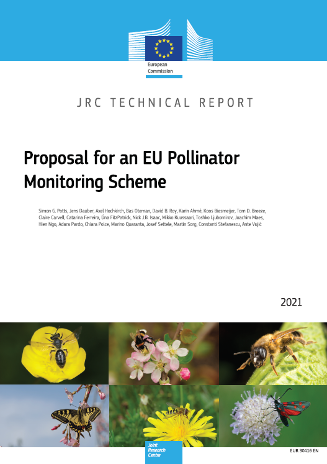
A recent JRC report proposes an EU Pollinator Monitoring Scheme (EU-PoMS), to harmonise the systematic monitoring of the status and trends pollinators across the EU.
As part of the EU Biodiversity Strategy and a major milestone of the EU Pollinators Initiative, the scheme will now be tested and piloted in Member States.
The EU-PoMS aims to develop a cost-effective Core Scheme for monitoring essential pollinators (wild bees, butterflies, hoverflies, moths, rare and threatened pollinator species) across the EU using standardised methods.
It includes a general EU indicator of the status and trends of pollinators and CAP-specific indicator to evaluate the impacts of the Common Agricultural Policy on both pollinators and pollination.
The scheme aims to provide credible science and data for designing and implementing effective policies that address the dual crises of biodiversity loss and climate change, thereby facilitating the kind of evidence-informed decision-making necessary to achieve a sustainable future.
Why are pollinating insects important?
Europe supports a rich diversity of wild pollinators: there are 2,051 species of bees, 482 species of butterflies, almost 1,000 species of hoverflies plus thousands of species of moths, flies, wasps, beetles and other insects.
Pollinators provide a wide range of benefits to society: they contribute more than €15 billion per year to the market value of European crops and pollinate 78% of wild flowering plants.
There is increasing evidence that many European pollinating species are declining. For instance, IUCN European Red Lists indicate that 37% of bee species and 31% of butterfly species have declining populations.
Yet, major gaps remain in our knowledge regarding the status and trends of pollinating insects. To close this gap, a group of 21 experts from across Europe have proposed a standardised EU pollinator monitoring scheme (EU-PoMS) to provide high quality data on pollinator and pollination trends.
A scheme to detect changes in the populations of pollinating insects
The EU-PoMS needs at least 2,120 sites across the EU where insects are monitored. This number ensures that we can detect significant changes in the abundance and species richness of at least 10% per decade for major pollinator groups and changes of 30% per decade for individual species. More sites are needed if we want to detect changes in populations smaller than 10% per decade.
The estimated cost of establishing and running a minimum scheme for the whole of the EU over a 10-year period would be approximately €13.3 million per year. Costs per Member State vary from €50,000 to €1.8 million per year, reflecting differences between the number of sites and national staff and equipment costs.
How can citizens contribute?
The expert report presents, for the first time ever, a standard approach for monitoring insects in the EU. This can help governments inform citizens about the state (i.e. health, population trends, etc.) of insects.
Importantly, citizens can contribute as well. The report recognises the enormous potential of citizen science to help environment administrations and research institutes collect data about pollinating insects.
The proposed monitoring network relies heavily on substantial citizen scientist participation in conjunction with professionals. National and regional insect monitoring initiatives can engage school children, families, students, and civil society to explore nature, learn from it and respect it more.
Next steps
The EU-PoMS will now be tested in the field with financial support from the European Parliament. Member States are starting to implement the EU-PoMS from very different positions in terms of, for instance, taxonomic capacity to support a scheme, availability of citizen scientists to participate, and the infrastructure needed to handle large numbers of insect samples.
In any case, the experts concluded that all Member States have, at a minimum, the ability to adopt a pilot scheme at this moment.
The EU Pollinators Initiative
This JRC report represents a milestone of the EU Pollinators Initiative, which was adopted on 1 June 2018. The initiative sets strategic objectives and a set of actions to be taken by the EU and its Member States to address the decline of pollinators in the EU and contribute to global conservation efforts. The European Commission is currently reviewing the initiative.
Further information
Related Content
Details
- Publication date
- 18 January 2021
